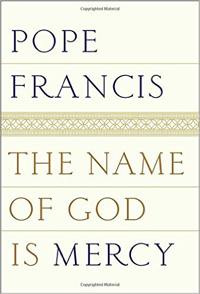 Pope Francis, The Name of God is Mercy; A Conversation with Andrea Tornielli (New York: Random House, 2016), 151pp.
Pope Francis, The Name of God is Mercy; A Conversation with Andrea Tornielli (New York: Random House, 2016), 151pp.
On December 8, 2015, Pope Francis announced the beginning of an "extraordinary" jubilee Year of Mercy, which will last through November 20, 2016.
After a two-hour mass before tens of thousands of worshipers, Francis began the Year of Mercy with a symbolic ritual — knocking on the massive bronze doors of the Basilica of St. Peter, and then walking through them. Whereas the door is usually sealed, this jubilee year the Vatican expects about 10 million pilgrims to walk through that same door.
The symbolic significance? "I am the door," said Jesus in John 10:7. And so Francis prayed, “You are the door through which we come to thee, inexhaustible source of consolation for everyone.”
“To pass through the Holy Door," said Pope Francis in his homily, "means to rediscover the infinite mercy of the father who welcomes everyone and goes out personally to encounter each of them.”
"How much wrong we do to God and his grace when we affirm that sins are punished by his judgment before putting first that they are forgiven by his mercy!"
"It is truly so," said Francis, paraphrasing James 2:13: "We have to put mercy before judgment, and in every case God’s judgment will always be in the light of his mercy."
"Let us abandon all fear and dread, for these do not befit men and women who are loved. Instead, let us live the joy of encounter with the grace that transforms all."
As Andrea Tornielli points out in his introduction to this book, divine mercy has been central to Pope Francis's papacy since the very beginning. On the morning of the very first Mass that he celebrated after being elected the Bishop of Rome (March 17, 2013), Pope Francis gave a homily on the woman who was caught in adultery. It was then almost exactly two years later, on April 11, 2015, when he issued his Papal Bull "Misericordiae Vultus ("The Face of Mercy"); Bull of Indiction of the Extraordinary Jubilee of Mercy."
The first part of this book consists of questions and answers between Tornielli and Pope Francis (pp. 5–99). Why are we sinners? What place does mercy have in the personal life of the Pope? Why is it important to go to confession? What do you need in order to obtain mercy? What is the relationship between mercy and justice? The confessional, says Francis, is neither a dry cleaner nor a torture chamber. The last part of the book contains the actual Papal Bull Misericordiae Vultus (pp. 103–151).
Pope Francis continues to surprise. He freely confesses his own sins and his personal need for forgiveness and mercy. At a meeting in a Bolivian prison, he told the inmates, "Standing before you is a man who has been forgiven for his many sins." And when he speaks about the church, he often uses bitter irony, as when he quotes Ambrose, "When it comes to bestowing grace, Christ is present; when it comes to exercising rigor, only the ministers of the church are present, but Christ is absent."
In his homily last December, Pope Francis put it this way: "You cannot conceive of a true Christian who is not merciful, just as you cannot conceive of God without his mercy. Mercy is the key word of the Gospel… We should not be afraid: We should allow ourselves to be embraced by the mercy of God, who waits for us and forgives everything.”


